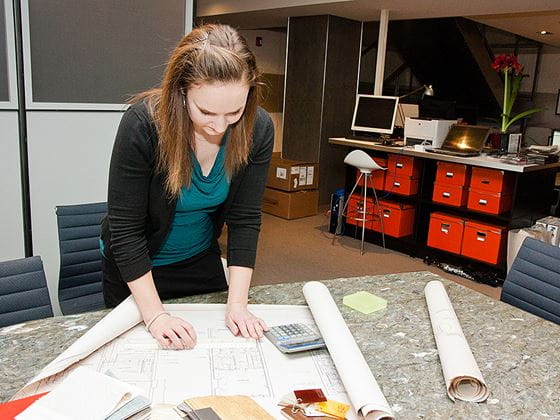-
Program Overview
Architectural design combines aesthetics and science to enhance our built environment in a sustainable and responsible way.
Whether you are seeking to become an architect, landscape architect, urban designer, or building science professional, Endicott’s pre-professional Bachelor of Fine Arts in Architectural Studies provides a path to explore and acquire the skills necessary to achieve your goals. Graduates wishing to become licensed in architecture, landscape architecture, or urban planning can pursue accredited graduate degrees. Our unique blend of rigorous classroom learning, real-world internship experiences, and faculty-led international study tours provide our graduates with a global design perspective.

-
Curriculum
Curriculum Requirements - Total Credits Required: 132
First Year - Credits: 34
- Individual and Society General Education Requirement (Cr: 3)
-
ARC 101 - Foundation of Architectural Studies (Cr: 3)
-
ARC 102 - Architecture Studio I: Sustainable Residential Design and Planning (Cr: 3)
-
ARC 103 - Media I: Architectural Drafting (Cr: 3)
-
ARC 104 - Media II: Architectural Delineation (Cr: 3)
-
ARC 112 - Spatial Perception and Visualization 2D/3D (Cr: 2)
-
ART 101 - Visual Art and Cultural Values I: Prehistory to c. 1310 (Cr: 3)
-
ART 102 - Visual Art and Cultural Values II: Early Fourteenth Century to the Present (Cr: 3)
-
ART 105 - Drawing and Composition I (Cr: 3)
-
ENG 111 - Critical Reading and Writing I (Cr: 3)
Satisfies the Writing Designated Core requirement.
-
ENG 112 - Critical Reading and Writing II (Cr: 3)
Satisfies the Writing Designated Core Requirement.
-
INT 100 - Internship I (Cr: 2)
Second Year - Credits: 35
- Literary Perspectives General Education Requirement (Cr: 3)
- Quantitative Reasoning General Education Requirement (Cr: 3) Calculus
-
ARC 201 - Architecture Studio II: Historic Preservation and Adaptive Re-Use (Cr: 3)
-
ARC 202 - Architecture Studio III: Workplace Environments (Cr: 3)
-
ARC 205 - Built Environment and Technology I: Site Structure Material Assembly (Cr: 3)
-
ARC 206 - Built Environment and Technology II: Building Systems (Cr: 3)
-
ARC 208 - Architectural Programming (Cr: 2)
-
ARC 210 - Structures I: Concrete, Masonry, Wood, Steel, Glass (Cr: 2)
-
ARC 220 - Electronic Media I (Cr: 3)
-
ARC 221 - Electronic Media II (Cr: 3)
-
ARC 247 - Environmental Psychology (Cr: 2)
-
ART 217 - History of Architecture and Interior Design I (Cr: 3)
-
INT 200 - Internship II (Cr: 2)
Third Year - Credits: 33
- Global Issues General Education Requirement (Cr: 3)
- Science and Technology General Education Requirement (Cr: 3)
- Values and Ethics General Education Requirement (Cr: 3)
-
ARC 301 - Architecture Studio IV: Urban Design and Landscape Architecture (Cr: 3)
-
ARC 302 - Architecture Studio V: Mega Structures and Skyscraper (Cr: 3)
-
ARC 305 - Built Environment and Technology III: Emerging Structures and Systems (Cr: 3)
-
ARC 306 - Built Environment IV: Contract Documents Studio (Cr: 3)
-
ARC 310 - Structures II: Emerging Structures (Cr: 2)
-
ARC 340 - Building Performance Analysis (Cr: 1)
-
ARC 345 - Professional Practice and Portfolio (Cr: 3)
-
ART 313 - History of Architecture and Interior Design II (Cr: 3)
-
ART 351 - Design Theory and Research Seminar (Cr: 3)
Fourth Year - Credits: 30
- General Education Electives (Cr: 9)
- World Cultures General Education Requirement (Cr: 3)
-
ARC 480 - Semester Internship (Cr: 12)
-
ARC 489 - Senior Research (Cr: 3)
-
ARC 491 - Senior Capstone (Cr: 3)
Diversity, Equity, & Inclusivity Requirements
Students take the following:
- DEI course attribute at any level
- DEI course attribute 200 level and above
-
AET 201 - Populations, Assessment, and Intervention (Cr: 3)
Learning Outcomes
Upon completion of the Architectural Studies program, students will:
- Demonstrate the critical inquiry and analysis skills needed to engage in intellectual discourse within the art fields.
- Demonstrate knowledge of and competency with computer technology as it is incorporated in both the artistic and engineering processes, including structural computation and building comfort analysis processes.
- Demonstrate knowledge of the principles of design and spatial relationships.
- Experience the relationship of academic studio practices to professional applications.
- Apply and integrate scholarly research methodologies, architectural history, design theory, analysis, and precedent investigative skills within the design process.
- Demonstrate an ability to apply human factors in context to the design of the built environment, including programming, environmental control systems, anthropometrics, ergonomics, proxemics, and Universal Design.
- Demonstrate familiarity with research theories and methodologies related to architectural design and the built environment.
- Demonstrate an understanding of the business practices within the architectural profession, including project management, ethics, communication, codes, and health, safety, and welfare.
- Display knowledge and skills in the use of basic through advanced tools, techniques, and processes sufficient to work from concept to finished design solution within the production of technical documentation and construction detailing.
- Apply the elements and principles of design.
- Clearly and concisely articulate design concepts and solutions to engage in intellectual discourse within the discipline.
- Demonstrate willingness to go beyond original parameters of assignment, introducing new emerging materials and forms, including unconventional topics and techniques.
- Discuss and present an awareness of innovative forward thinking within small class learning environments that encourage risk taking and foster originality.
View academic catalog and learning outcomes -
Internships and Careers
Internship Sites
• Gensler
• Perkins + Will Architects
• Winter Street Architects
• Bergmeyer Architects
• Steffian Bradley Architects
Fifth Year M.A. in Interior Architecture
Accreditations
Endicott’s Architectural Studies program is committed to instructing our students in current trends and best practices within the field of architectural design. The Bachelor of Fine Arts in Architectural Studies is an Affiliate Member with the Association of Collegiate Schools of Architecture (ACSA) with a mission to lead architectural education and research.





